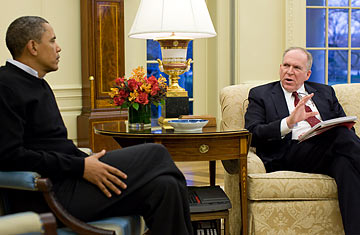
President Barack Obama meets with John Brennan, Deputy National Security Adviser for Homeland Security and Counterterrorism, in the Oval Office
John Brennan, Deputy National Security Adviser for Homeland Security and Counterterrorism, is now President Barack Obama's official attack dog in an escalating war of words with Republicans. He has taken on the task of appearing in the media to systematically rebut what he says are politically motivated criticisms of the Administration's counterterrorism tactics. Brennan is a good pick for the job. A longtime CIA official who was blocked by the Democratic left from becoming the head of the CIA because of his service under former President George W. Bush, Brennan has the look of a prizefighter and presents a tough-guy image for the White House. The problem is that he is taking on not just Republicans but also a majority of Americans — and even arguing against positions that Obama took during the 2008 campaign.
The debate over counterterrorism tactics has seen a shift to the right over the past year. Republicans are now criticizing Obama for policies that were embraced by Bush during his last years in office, like closing the Guantánamo Bay detention facility, pursuing civilian trials for terrorism suspects and repatriating and releasing detainees held in U.S. custody. At the same time, Obama is touting the use of Bush-era tactics he once deplored, like the use of military tribunals, detention without trial and an expansive interpretation of the state's secrecy doctrine.
Brennan is not only citing the Bush-like policies that are being adopted by Obama; he's even turning to the Dick Cheney playbook to put opponents back on their heels. On Meet the Press on Feb. 7, Brennan used the "We briefed them" gambit, saying he had informed GOP leaders immediately after the failed Dec. 25 bomb attempt that the suspect was in FBI custody. He said it was clear by implication that the suspect would be read his Miranda rights, a fact to which the Republicans now object. "None of those individuals raised any concerns with me at that point," Brennan said.
To the extent that Brennan and the White House adopt the Bush Administration's approach on security, they win with the public. Americans approve of Obama when he gets tough on terrorists, as he did in the wake of the attempted bombing of a U.S. airliner on Christmas Day. His numbers for handling terrorism went up 4 points in a USA Today-Gallup poll after he demanded a shake-up in the intelligence and security systems following the Christmas Day attempt, and his handling of the incident was viewed favorably by 57% to 39% of respondents to a CNN poll.
What Americans don't like is when it sounds as if Obama is deferring to legislative or court-mandated rules on dealing with terrorism suspects. They dislike civilian trials for those suspects — 57% want the Christmas Day suspect tried in a military court, vs. 42% for a civilian trial, according to the CNN poll. And 55% want Guantánamo to stay open, while 32% want it closed, according to a CBS poll. A surprising 51% of people surveyed in January said it was necessary to give up some civil liberties to make the country safer from terrorism.
In the end, it's a question of degree. Every President has to defer to the courts and Congress. The GOP is now arguing for positions that even conservative judges and members of Congress previously found unacceptable, such as denying terrorism suspects access to lawyers or civilian courts.
But the public doesn't see shades of gray on these issues, and Obama has already retreated once on the question of civil liberties vs. security. That leaves Brennan arguing against some of the pro–civil liberties positions that Obama took on the campaign trail, while also countering new GOP positions well to the right of Bush. The White House is furiously disseminating data points to show that Obama is doing just what Bush did in the war on terrorism.
In the process, Obama has moved his own positions toward those of his top counterterrorism adviser. And Brennan is ready to fight for those, even against some members of Obama's political team in internal Administration debates. But if Brennan has won the debate inside the White House, he faces a tougher sell to the general public. Can he convince Americans that putting terrorism suspects into FBI custody, giving them lawyers and closing down Guantánamo Bay is going to make the country safer? If Barack Obama hasn't been able to do that, it's hard to see how John Brennan will.
